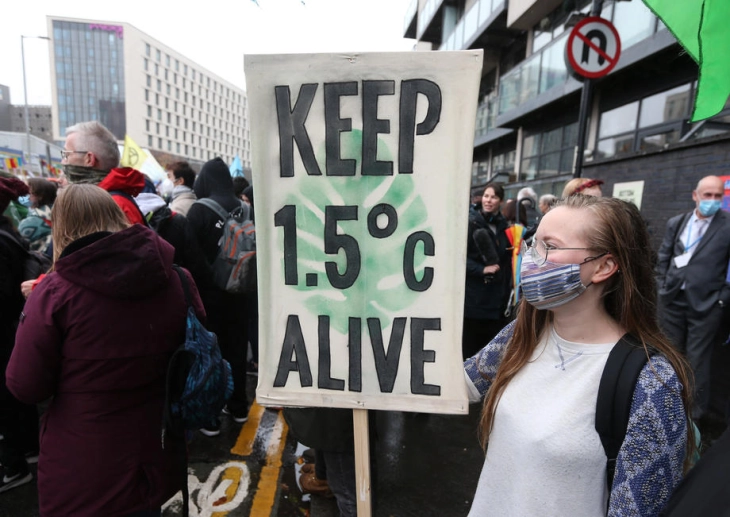COP26 goes into overtime as nations seek agreement on climate action

Glasgow, 13 November 2021 (dpa/MIA) - Efforts to strike agreement on climate action have continued at the Cop26 talks, as the Glasgow summit went into overtime.
At an afternoon plenary, countries set out their views on the latest drafts of the agreements that could be secured at the UN conference, which had been published earlier in the day.
Many developing countries called for more finance for poorer nations to develop cleanly and adapt to the changing climate, and for support for the loss and damage they are facing from rising seas and more extreme weather.
Boris Johnson appeared to back their calls when he said the developing world "needs to see the cash on the table" at the talks to secure a deal.
A range of countries called for stronger action on phasing out fossil fuels after language on accelerating a phase-out of coal and subsidies for fossil fuels was weakened in the latest draft of the overarching "cover decision" that could be secured at the talks.
And there were warnings that limiting temperature rises to 1.5C, beyond which the worst impacts of climate change will be felt, was a "matter of life and death."
While visiting a vaccination centre in Sidcup, south-east London, the Prime Minister said the UK hosts of Cop26 were moving "heaven and earth" to get everyone to see the vital importance of agreement at the talks, to keep the prospect of limiting warming to 1.5C alive.
He said: "We do need to see the cash on the table to help the developing world to make the necessary changes.
"That's what needs to happen in the next few hours.
"People need to see that there's enough cash to make a start, and there's enough commitment to make a start.
"And that if they can have the courage to do this deal, to agree the cover decision that's on the table today then we will have a road map that will enable us to go forward and start to remove the threat of anthropogenic climate change.
"We won't clinch it all at Cop but we can start."
In the Paris Agreement in 2015, countries committed to limit temperature rises to ``well below'' 2C and try to limit them to 1.5C to avoid the most dangerous impacts of storms, droughts, crop failures, floods and disease.
Scientists have warned that keeping temperature rises to 1.5C requires global emissions to be cut by 45% by 2030, and to zero overall by mid-century.
But despite countries being required to update their action plans, known as nationally determined contributions, for emissions cuts up to 2030 in the run-up to Glasgow, the latest pledges leave the world well off track to meet the goal.
Therefore, countries are under pressure to come up with a deal in Glasgow that will see them rapidly increase their ambition for emission cuts in the 2020s to stop the 1.5C goal slipping out of reach.
The new version of the cover decision ``requests'' countries to revisit and strengthen their plans for 2030 within the next year in line with the Paris temperature goal - seen as stronger language than the first draft which "urges" countries to do so.
The latest version has weakened language on fossil fuels, but the historic reference - a first for a climate decision of this type - is still there, despite scepticism it will survive to the final draft.
The first draft of the ``cover decision'' called for countries "to accelerate the phasing-out of coal and subsidies for fossil fuels."
In a new draft produced on Friday morning, that changed to "accelerating the phaseout of unabated coal power and of inefficient subsidies for fossil fuels."
The new draft also includes a date of 2025 for developed countries to double the share of finance that is going to help poorer and more vulnerable nations adapt to the impacts of climate change that they have done least to cause.
There are also drafts to finalise the ``Paris rulebook'', including on creating carbon markets and delivering transparency to help assess what countries are doing, to make the Paris climate accord operational and effective.
In the afternoon plenary, dozens of countries, including some representing wider groups of nations, spoke out about the drafts on the table.
Kenya's representative said 1.5C was "not just a statistic, it is a matter of life and death," while US climate envoy John Kerry said the world cannot abandon a target to limit global warming to 1.5C as he described spending money on fossil fuel subsidies as "insanity."
EU executive vice president Frans Timmermans said "1.5C is about avoiding a future for our children and grandchildren that is unliveable."
China indicated it would be willing to support a Cop26 agreement but expressed disappointment about a lack of details on how to achieve the 100 billion dollar a year climate finance pledge for poorer nations.
Shadow business secretary Ed Miliband has called for developed countries to deliver on the long-promised money - which was due to be achieved by 2020 but will not be delivered until 2022 at the earliest - in order to rebuild an alliance between developed and vulnerable countries to push for action.
At the meeting of countries, Cop26 President Alok Sharma urged negotiators to put in a final injection of can-do spirit, and to deliver on the high ambition set by world leaders at the start of the summit.
The talks are expected to go into Saturday afternoon, with new versions of texts set to be published in the morning and countries due to come back to another meeting later in the day.







